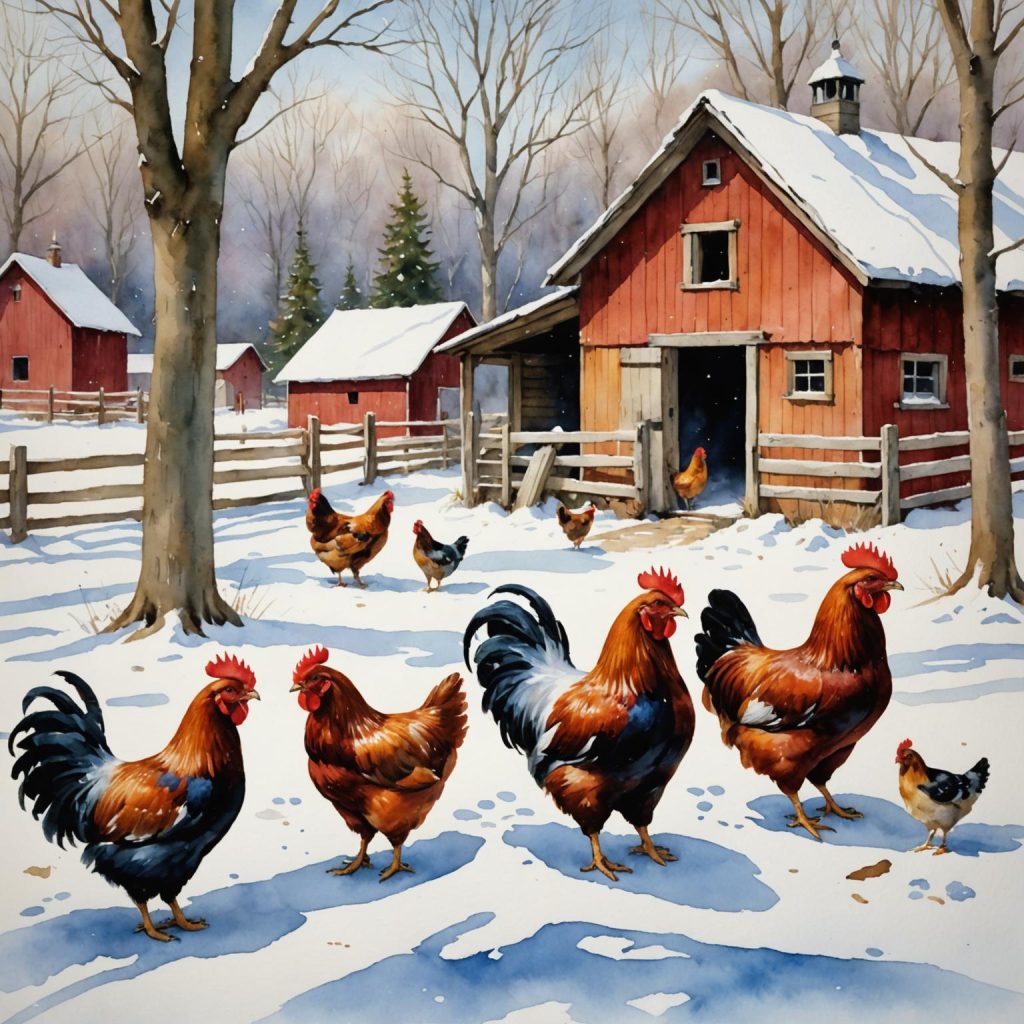Chickens, like all animals, have specific needs that must be met in order for them to thrive, especially during the winter months. Understanding these needs is crucial for ensuring the health and well-being of your flock. In winter, chickens require a warm and dry environment to protect them from the cold and damp conditions. They also need access to fresh water and nutritious food to maintain their energy levels and stay healthy. Additionally, chickens need proper ventilation and airflow to prevent the buildup of moisture and ammonia in their coop, which can lead to respiratory issues. By understanding and addressing these needs, you can create a comfortable and safe environment for your chickens during the winter.
Chickens are sensitive to cold temperatures and can suffer from frostbite and hypothermia if not provided with adequate shelter. It is important to provide a cozy and insulated chicken coop that offers protection from the elements. Additionally, chickens need access to warm bedding and roosting options to keep them comfortable and warm during the colder months. By understanding the specific needs of chickens in winter, you can take the necessary steps to create a suitable environment for your flock.
Table of Contents
Creating a Cozy and Insulated Chicken Coop
Creating a cozy and insulated chicken coop is essential for providing a warm and comfortable environment for your flock during the winter months. Insulating the walls and roof of the coop can help retain heat and keep the interior warm. Additionally, sealing any drafts or gaps in the coop can prevent cold air from entering and warm air from escaping. Providing adequate insulation and sealing off drafts can help maintain a comfortable temperature inside the coop, even when temperatures drop outside.
In addition to insulation, providing a cozy environment for your chickens also involves offering warm bedding and roosting options. Adding extra bedding such as straw or wood shavings can provide additional warmth and comfort for your flock. Roosting bars should also be provided at varying heights to allow chickens to huddle together and keep each other warm. By creating a cozy and insulated chicken coop, you can ensure that your flock has a comfortable and safe shelter during the winter months.
Providing Proper Ventilation and Airflow
While it is important to create a cozy and insulated chicken coop, it is equally important to provide proper ventilation and airflow to prevent the buildup of moisture and ammonia. Poor ventilation can lead to respiratory issues and other health problems for your chickens. To ensure proper ventilation, consider installing vents or windows that can be opened or closed as needed to regulate airflow. Additionally, providing adequate space between the roof and walls of the coop can allow for natural airflow without creating drafts.
In addition to ventilation, it is important to monitor the humidity levels inside the coop. High humidity can lead to moisture buildup, which can create a damp environment that is conducive to respiratory issues and frostbite. By providing proper ventilation and airflow, you can create a healthy and comfortable environment for your chickens during the winter months.
Offering Warm Bedding and Roosting Options
In addition to creating a cozy and insulated chicken coop, offering warm bedding and roosting options is essential for keeping your flock comfortable during the winter months. Adding extra bedding such as straw or wood shavings can provide additional warmth and insulation for your chickens. It is important to regularly clean and replace bedding to ensure that it remains dry and free from mold or mildew.
Roosting bars should also be provided at varying heights to allow chickens to huddle together and keep each other warm. Chickens naturally roost at night to stay off the ground and conserve body heat, so providing adequate roosting options is crucial for their comfort during the winter. By offering warm bedding and roosting options, you can help your flock stay warm and comfortable throughout the colder months.
Ensuring Access to Fresh Water and Nutritious Food
During the winter months, it is important to ensure that your chickens have access to fresh water and nutritious food to maintain their energy levels and stay healthy. Freezing temperatures can make it challenging for chickens to access water, so it is important to regularly check water sources and break up any ice that may have formed. Consider using heated waterers or adding warm water to prevent freezing.
In addition to water, providing nutritious food is essential for keeping your flock healthy during the winter. Chickens require a balanced diet that includes protein, carbohydrates, vitamins, and minerals to support their overall health and well-being. Consider supplementing their diet with additional protein-rich treats such as mealworms or black soldier fly larvae to help them stay warm and maintain their energy levels. By ensuring access to fresh water and nutritious food, you can help your chickens stay healthy and strong throughout the winter months.
Implementing Additional Heating Options
In some cases, additional heating options may be necessary to provide extra warmth for your chickens during particularly cold spells. While a well-insulated coop with proper ventilation should be sufficient for most situations, extreme cold temperatures may require supplemental heating. Consider using heat lamps or radiant heaters to provide additional warmth inside the coop.
When implementing additional heating options, it is important to take safety precautions to prevent fire hazards or injuries to your flock. Ensure that heating devices are securely installed and positioned away from flammable materials such as bedding or nesting materials. Additionally, regularly check heating devices for any signs of wear or damage, and monitor temperature levels inside the coop to prevent overheating. By implementing additional heating options when necessary, you can provide extra warmth for your chickens during the winter months.
Monitoring and Adjusting for Optimal Comfort
Finally, it is important to regularly monitor the conditions inside the chicken coop and make adjustments as needed to ensure optimal comfort for your flock. Check for signs of moisture buildup, drafts, or temperature fluctuations, and make any necessary changes to maintain a healthy environment for your chickens. Additionally, observe your flock for any signs of discomfort or distress, such as huddling together for warmth or exhibiting signs of illness.
By monitoring the conditions inside the coop and observing your flock’s behavior, you can make informed decisions about how to best meet their needs during the winter months. Regularly checking water sources, food supplies, bedding, and roosting options can help ensure that your chickens have everything they need to stay warm, comfortable, and healthy throughout the colder months. By monitoring and adjusting for optimal comfort, you can provide a safe and cozy environment for your flock during the winter.
Meet Walter, the feathered-friend fanatic of Florida! Nestled in the sunshine state, Walter struts through life with his feathered companions, clucking his way to happiness. With a coop that’s fancier than a five-star hotel, he’s the Don Juan of the chicken world. When he’s not teaching his hens to do the cha-cha, you’ll find him in a heated debate with his prized rooster, Sir Clucks-a-Lot. Walter’s poultry passion is no yolk; he’s the sunny-side-up guy you never knew you needed in your flock of friends!







